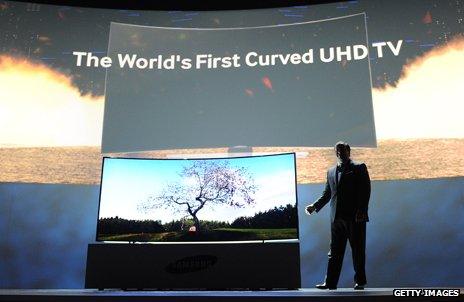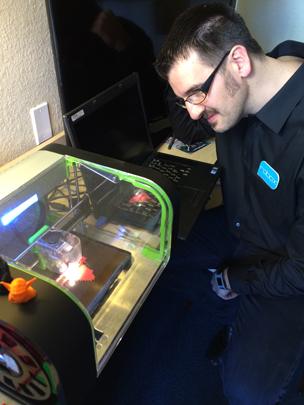Giants and start-ups compete at CES
- Published
- comments

At CES you find both ends of the technology spectrum - giant companies spending a fortune to reinforce their position in the market, and tiny upstarts struggling to make an impact on a shoestring budget. On Monday I saw both ends of the spectrum.
The giant is Samsung - the biggest noise in technology right now, especially at a show which has never featured Apple and where Microsoft now keeps a low profile. Its press conference in the Mandalay Bay Hotel ballroom is packed to overflowing, and designed to leave the audience in awe at the sheer scale of the Korean firm's ambitions.
It starts with grand pronouncements by top executives - 2014 is definitely going to the the year of the "internet of things", says one. Global connectivity, an aging population, and the climate are amongst Samsung's preoccupations, says another.
Then come the product announcements. The Samsung Smart Home Platform is going to allow us to turn off the lights simply by saying "Going out" to our Galaxy Gear smartwatch (or another device, once rival companies see the sense of climbing aboard the new service).
A huge 12-inch Galaxy Pro tablet signals Samsung's desire to compete on every level in mobile devices - this one is aimed at busy professionals who might otherwise be tempted by a Microsoft Surface.
We are also treated to a whole range of household appliances, with celebrity chefs hauled onstage to praise a new cooker, but the star of the show is a TV. And here's where it all went wrong. After unveiling a 105-inch ultra high definition curved television - a beautiful but somehow unlikely product - Samsung summons Michael Bay, the director of Transformers and other blockbuster movies to big it up.
Michael Bay initially said he would "wing it" after his autocue malfunctioned
But after stuttering a few phrases about creating visual worlds beyond everyday experience, he loses his thread, blaming a failing teleprompter and departs abruptly. Suddenly the curtain is pulled back on the whole strange business of celebrity endorsements - if someone cannot think of a single thing to say about your product unless they're reading words off a screen, is their support worthwhile?

Chris Elsworthy and his 3D printer
At a cheap motel off the Las Vegas strip another CES exhibitor is having a rather different kind of day. Chris Elsworthy has just got off the plane after a 36-hour journey from the UK, with a night in Houston as an optional extra when his connecting flight was cancelled due to bad weather.
But he and his colleague from Robox, a 3D printing start-up, are in good spirits as they prepare their assault on Vegas. Chris's design firm, based in Portishead near Bristol, employs just seven people in the UK but like other innovative entrepreneurs he's found that Kickstarter is the way to get your product in front of a global audience.
He raised more than £280,000 on the crowdfunding site for a desktop 3D printer that looks clever but is a long way from being ready for the market. So CES is the next stage in raising awareness about his vision of simple and reliable 3D printing for people who don't want to read a manual. Even with budget flights and cheap lodgings, coming here has been a big expensive gamble.
"I'm nervous about Vegas, and about CES - but not about the product," he tells me. Having trained as an engineer, and then used techniques such as 3D printing as he built his design business, he's evangelical about technology that lets you make things. But he hopes his Robox printer can help demystify that process. "I think 3D printing can take what I think is easy to the general public so that they can make things they want."
It is always inspiring to meet a British innovator with the ambition to go global. Chris Elsworthy will be competing for attention in the CES 3D zone with big US names like Makerbot but is refreshingly confident about that. Let's just hope he doesn't invite Michael Bay to come and rave about his product...